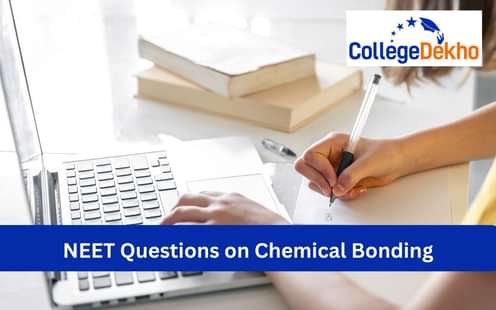
NEET Questions on Chemical Bonding explains the important questions that might be repeated from the previous years in the upcoming NEET 2025 Exam . The NEET Questions on Chemical Bonding with Solutions help candidates understand and form an idea about the types of questions that might be asked in this chapter. It is a known fact that the NEET Syllabus 2025 includes topics from both Classes XI and XII of the CBSE curriculum. The Chemical Bonding is the 4th Chapter from Class XI. As per the NEET 2025 chapter wise weightage, it is likely that the total weightage of the Chemical Bonding chapter is going to be 7%. Likely, a total of 5 to 8 NEET MCQs on Chemical Bonding will be asked in the exam. Students must make sure to regularly solve the previous year question papers and attempt mock tests to pass the NEET Exam 2025 without any hurdles.
Important NEET Questions on Chemical Bonding is one of the most elaborate chapters of chemistry that is included in the exam. Some of the topics covered in the NEET Questions on Chemical Bonding with Solutions are Covalent bonding, Ionic bonding, Bond parameters, VSEPR theory, Valence bond theory, Molecular orbital theory, and Dipole moment. As per toppers suggestion, one of the most effective ways to prepare the Important NEET Questions on Chemical Bonding is to regularly solve previous year question papers, attempt mock tests, and refer to the best books. Candidates should also focus on preparing the Chemistry Formulas for NEET 2025 as the chapter includes many numeric problems. Read the article below to learn in detail about the NEET Questions on Chemical Bonding, important questions, and how to prepare.
List of NEET Questions on Chemical Bonding with Solutions
Candidates can refer to the questions below to generate an idea about the types of NEET Questions on Chemical Bonding with Solutions
Q.1 C-O bond length is minimum in
CO2
CO32-
HCOO–
CO
Answer: D
Q.2 MX6 is a molecule with octahedral geometry. How many X – M – X bonds are at 180°?
Four
Two
Three
Six
Answer: C
Q.3 Find the pair with sp2 hybridization of the central molecule
NH3 and NO2–
BF3 and NH2–
BF3 and NO2–
NH2– and H2O
Answer: C
Q.4 Molecules are held together in a crystal by
hydrogen bond
electrostatic attraction
Van der Waal’s attraction
dipole-dipole attraction
Answer: C
Q.5 The formal charge and P-O bond order in PO43- respectively are
0.6, -0.75
-0.75, 1.25
1.0, -0.75
1.25, -3
Answer: B
Q.6 Sp3d2 hybridization is present in [Co(NH3)63+], find its geometry
octahedral geometry
square planar geometry
tetragonal geometry
tetrahedral geometry
Answer: A
Q.7 Which of the molecules does not have a permanent dipole moment?
SO3
SO2
H2S
CS2
Answer: D
Q.8 Find the molecule with the maximum dipole moment
CH4
NH3
CO2
NF3
Answer: B
Q.9 ℼ – dℼ bonding is present in which molecule
SO32-
CO32-
NO3–
BO33-
Answer: A
Q.10 Which one has a pyramidal shape?
SO3
PCl3
CO32-
NO3–
Answer: B
Q.11 The ionic bonds X+Y– are formed when
The electron affinity of Y is high
the ionization energy of X low
The lattice energy of XY is high
The lattice energy of XY is low
(i) and (ii)
(ii) and (iii)
(i), (ii) and (iii)
(i), (ii), (iii) and (iv)
Answer: C
Q.12 Potassium forms a highly ionic compound when it combines with
Chlorine
Fluorine
Bromine
Iodine
Answer: B
Q.13 Which type of chemical bond involves the transfer of electrons from one atom to another
Covalent
Ionic
Metallic
Hydrogen
Answer: B
Q.14 A highly ionic compound is formed by the combination of elements belonging to
IA group and VIIA group
IIA group VIA Group
IIIA group and VA group
‘O’ group and VIIA group
Answer: A
Q.15 An ionic compound A+B– is most likely to be formed when
the ionization energy of A high and the electron affinity of B is low
the ionization energy of A is low and the electron affinity of B is high
both the ionization energy of A and the electron affinity of B are high
both the ionization energy of A and the electron affinity of B are low
Answer: B
Q.16 Identify the favorable conditions for the formation of ionic bonds
Low IP value of metal, low EA value of non-metal
High IP value of metal, high EA value of non-metal
High IP value of metal, low IP value of non-metal
Low IP value of metal, high EA value of non-metal
Answer: D
Q.17 Which of the following is a favorable factor for cation formation?
Low ionization potential
High electron affinity
High electronegativity
Small atomic size
Answer: A
Q.18 How do covalent bonds differ from ionic bonds regarding electron interaction?
Covalent bonds involve the transfer of electrons, while ionic bonds involve electron sharing
Covalent bonds involve electron sharing, while ionic bonds involve the transfer of electrons
Covalent bonds and ionic bonds both involve electron transfer
Covalent bonds and ionic bonds are identical in electron behavior
Answer: B
Q.19 Statement I: NaCl is more ionic than NaI
Statement II: Chlorine is more electronegative than iodine
I. Statement-I and Statement-II both are correct
II. Statement I is correct but Statement II is incorrect
III. Statement I is incorrect but Statement II is correct
IV. Statement-I and Statement-II both are incorrect
Answer: A
Q.20 An electrovalent compound does not exhibit space isomerism because of
presence of oppositely charged ions.
high melting points
non-directional nature of the bond
crystalline nature
Answer: C
Q.21 The lattice energies of KF, KCl, KBr, and KI follow the order
KF > KCl > KBr > KI
KI > KBr > KCl > KF
KF > KCl > KI > KBr
KI > KBr > KF > KCl
Answer: A
Q.22 Arrange the following in increasing order of lattice energy. LiCl, NaCl, KCl, RbCl, CsCl
CsCl < RbCl < KCl < NaCl < LiCl
LiCl < RbCl < KCl < NaCl < CsCl
LiCl < NaCl < KCl < RbCl < CsCl
None of these
Answer: A
Q.23 Which of the following is not a characteristic of a covalent compound?
Low melting point
No definite geometry
Insoluble in polar solvent
Small difference in electronegativity between the combining atoms
Answer: B
Q.24 Which of the following has maximum lattice energy?
LiF
CsCl
KBr
NaCl
Answer: A
Q.25 Indicate the nature of bonding in a diamond.
Ionic
Covalent
Molecular
Metallic
Answer: B
NEET Questions with Solutions on Chemical Bonding is very important for the candidates to prepare. The chapter is elaborate and contains a lot of important formulas and reactions. Moreover, the total weighatge of the chapter is 7%. It would be a foolish move if students choose not to prepare the NEET MCQ on Chemical Bonding as 5 to 7 questions can be asked in the exam. One of the preparation tips shared by experts on preparing the Important NEET Questions on Chemical Bonding is to clear the doubts of the candidates while they still have time for preparation. Students are also suggested to use learning materials like diagrams, charts, models, previous year question papers, and planners can help candidates prepare the NEET MCQ Questions on Chemical Bonding. Regularly attending the mock test will also aid candidates in answering all the NEET MCQs on Chemical Bonding without making any mistakes. For more articles related to Nursing, Paramedical, and Medical, follow CollegeDekho.
Related Articles:

















Similar Articles
Why Understanding the NEET 2026 Syllabus Early Can Change Preparation
List of Medical Colleges for 500-600 Marks in NEET 2025
NEET 2025 Marks vs Rank (Out) : Check NEET Percentile Analysis
NEET 2025 Cutoff for BHMS (Out) - General, OBC, SC, ST Category
West Bengal NEET Cut Off 2025: AIQ & State Quota Seats
MBBS Admissions for NRI Quota in NEET 2026: Eligibility, Documents, Quota, Colleges